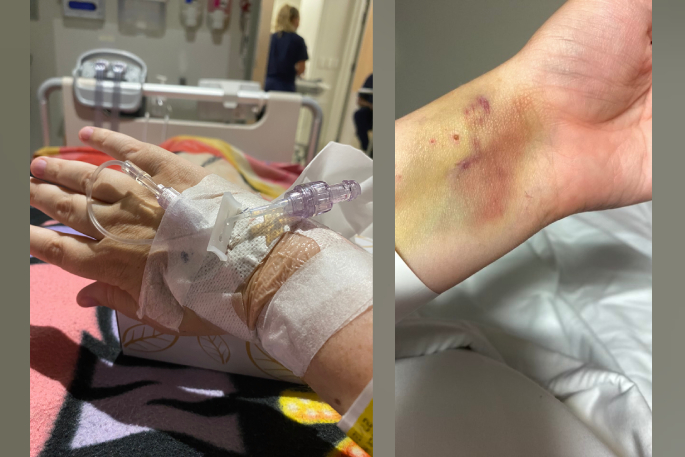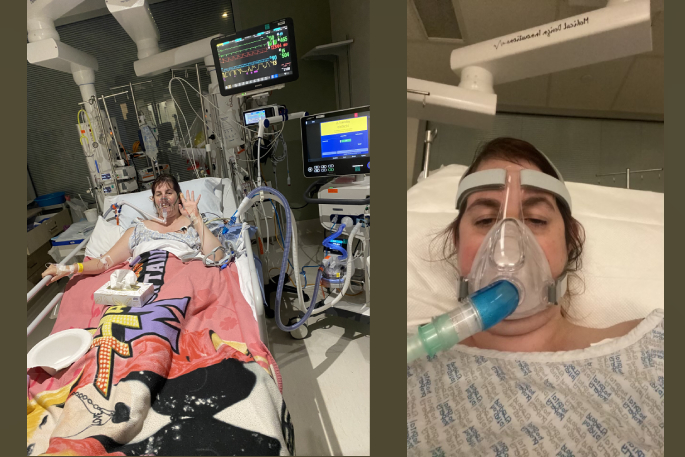A support group for those with muscular dystrophy is starting in the Bay of Plenty.
Michelle Wilson was diagnosed at 10 years old and has now been living with the condition for 27 years.
Muscular dystrophy is a genetic condition that causes progressive weakness and loss of muscle mass. It is a condition with no cure.
“What has happened is that Nana has passed it to her two sons, and the two sons passed in on to their two daughters. They’re all gone,” said Michelle’s mother, Lynn Phillips.
Michelle is in the fifth generation of her family with the condition.
“These people need help,” said Lynn.
“Michelle and I have been flying solo for years by ourselves because there’s no help down here in town.”
Lynn said there are six people in Tauranga – that she knows of – with the condition.
“I’d like to start something to help support people.”
Lynn said it was important for her to organise a support group for those with the condition and their families and caregivers so they could learn more about the condition and support each other.
Kelly Francis and her family were relieved when they found out about the support group and that there were people they could relate to.
“We’re trying to educate ourselves as well as Kelly and give her some support with people who’ve got it who can come together and talk about their experiences and how they manage to overcome some things that she might have,” said Lynn.
At their first meeting, on Sunday, August 25, they had a turnout of 30 people. Six had the condition and the rest were family members and caregivers.
“It doesn’t just affect the person that’s got it. It affects everybody in the family.”
Lynn said there is a desperate need for a support group in the Bay of Plenty, she said they even had someone come over from Hamilton with the condition to attend the meeting.
She said the plan for the group is to catch up monthly for coffee and activities, every second Saturday of the month at lunchtime.
New Zealand Muscular Dystrophy Association
“I didn’t know anything,” said Michelle. “They just said, ‘Oh you’ve got it’, and that was pretty much it.
“I had to compose myself for about three days straight and then I said to myself, ‘No, I can’t change it, so why cry?’
“I decided to ring up and get some information from the [Northern Muscular Dystrophy] Association. I’m still learning.”
Michelle said she refrains from getting information from online. “Don’t go online and Google it because it just shows the worst-case scenario. It is very bad.
The NZ Muscular Dystrophy Association (NZMDA) has three branches, said the national executive chairman, Trevor Jenkin.
There’s a northern branch, a central branch and a southern branch, all providing support and services for people with muscular dystrophy from around the country.
NZMDA has fieldworkers who visit people with the condition at their homes to check in and see how they are doing.
“Our fieldworkers work in the community to provide personalised support and education, in the area of rare neuromuscular conditions covered by Muscular Dystrophy Association New Zealand,” said Trevor.
“Personalised support may include supporting through diagnosis, walking alongside during times of grief and change, offering information and advice about conditions, facilitating service access through referrals or advocacy, or reducing isolation by linking people to others with shared experience.”
As a charity organisation with very little government funding, the association does everything it can with the resources that it has, explains Trevor.
“There are around 810 members that require our services,” he said.
Michelle’s story
When asked how much her condition affects her life, Michelle said it impacts every day.
Even walking becomes difficult, and eventually impossible as the muscles in the feet and legs weaken.
Michelle is still able to walk with a walking stick but said it won’t be long until she has to move into a wheelchair.
“I can’t work,” she said. “There’s fatigue syndrome that comes along with it.”
Due to the constant fatigue, Michelle often has to take naps.
“You have to have blood tests every six months for your liver and kidneys.”
Even her tongue muscle is affected, causing her speech to slur.
“I have to ... pronounce my words clearly because sometimes it can sound a bit drunk. It affects every part of your body.”
Michelle’s dad had the condition. Lynn said they didn’t know what was going on with him. She thought he was lazy because he often didn’t want to get up and go to work, causing him to lose several jobs.
It wasn’t until he was diagnosed with the condition they understood what was wrong with him.
When Michelle’s father was diagnosed, Michelle was also tested. As a genetic condition that may not uncover itself until a person is in their 20s or 30s, it was important for Michelle to know whether she had it so she could decide whether she wanted to have children and pass it on to them.
Lynn said the condition gets progressively worse from generation to generation. Michelle made the difficult decision not to have children, even though she had wanted to be a mother. “Now I have a fur baby,” she said pointing to her cat, Bailey.
Michelle learned a lot from her father and his experience with the condition. She said one day he fell asleep at the wheel due to fatigue and got into a crash. “He was in a coma for three days,” said Lynn.
Michelle decided – even though she still felt she was able – to not drive any more.
Lynn said there were signs when Michelle was little.
“If she’d been on the trampoline, she would come back with big black eggs on her ankles and she sprained her ankles all the time.”
“In school sports, I was always coming in last,” said Michelle.
“I knew something was wrong,” said Lynn. “I knew.
“She used to come home from school and want to go to sleep, she would sleep on the couch, and I would call her in for dinner.”
They say that when they found out about the condition all their questions were answered and it suddenly all made sense.
Michelle is under the hospital system for respiratory, cardiac, physio, neurology, the list goes on.
Fortunately, all of Michelle’s appointments through the hospital are free. However, if she needs an appointment and they don’t have one available, she has to go private, and that’s when things get expensive, she said.
Kelly’s story
On Thursday, January 11, 33-year-old Kelly Francis was diagnosed with muscular dystrophy after spending three weeks in hospital with doctors, nurses and specialists not knowing what was wrong with her.
Kelly came up to her mum in distress on Boxing Day night experiencing serious pains in her abdomen. Kelly’s mum, Cathy Francis, rang for an ambulance, thinking Kelly had appendicitis.
“I was screaming and crying because it was so painful,” said Kelly. She later found out this pain was caused by her lungs collapsing.

Kelly Francis in hospital with so many blood tests and needles she felt like a "pin cushion".
After countless blood tests – so many that her supportive 22-year-old younger brother, Jarod Francis, called her a “pin cushion” – she was diagnosed with the condition.
“It was weeks and weeks before we knew anything,” said Cathy. In that time Kelly spent a week in Tauranga Hospital before being transferred and spending a further couple of weeks in Waikato Hospital.
Cathy said it was incredibly frustrating watching her pale daughter in pain while they waited for her diagnosis.
While Kelly was waiting to find out what was wrong with her, she was terrified and in a lot of pain.
When asked what was going through her head at the time, she said, “[I thought] I’m going to die. I thought that every day.
“I thought, if I die today, I’m not going to see my mum, my brother, my stepdad, my boyfriend, my cat.”

Kelly Francis in hospital waiting for her diagnosis.
There was a mixture of feelings when Kelly was diagnosed. Jared said he felt really scared, not only about the safety of his sister but also about potentially having the condition himself.
Cathy felt an overwhelming bout of guilt. “When I found out I felt so guilty, because she was sick and I couldn’t help,” Kelly’s mum said through tears.
The diagnosis shocked the family and Cathy and Jarod also got tested. Cathy was also diagnosed with the condition but isn’t yet experiencing symptoms; Jarod tested negative.
Kelly said the pain is constant. “I’m sore every day, aches and pains all over the place. If I can’t handle the pain I need to go to the hospital. Most of the time, I’ll stay overnight.”
When asked how the condition has affected her life, Kelly said it impacts everything, from doing the laundry to walking upstairs or going for walks like she used to with Jarod.
“Day-to-day things that people take for granted, I can’t do any more,” said Kelly. This means she has to ask for help with things that wouldn’t have taken a second thought before.
“I find it hard to ask for help sometimes because I want to try and do it myself.”
The biggest impact Kelly said this condition has on her life is the decision she has made not to have children.
“That hurts me a lot. All I want in my life is to be a mum, and now I can’t.”
Before Kelly was diagnosed, she experienced a serious heartbreak when she lost her baby at seven months pregnant. Cathy said they were all ready for the baby girl and they were really excited. “We were all waiting for a baby, we had everything, but it didn’t come.”
Cathy said Kelly had a name picked out and everything. Kelly said it hurt more than anything she had experienced before.
That was until her muscular dystrophy reared its ugly head.
“I just thought, I want to die.”
Kelly seemed incredibly grateful for her family’s support. “I’m probably a wreck at the moment, but my family is still always there for me.”
After all these struggles, Kelly and her family want to make sure other people don’t need to suffer as much as they have.
“We just want to raise awareness because there might be somebody else out there.”
Kelly said the support group meetings are really fun because she gets to meet new people who are going through the same thing she is.
-with-Michelle-Wilson,-Cathy-Francis-and-Kelly-Francis..jpg)
Lynn Phillips (left) with Michelle Wilson, Cathy Francis and Kelly Francis. Photo / Ayla Yeoman
Kelly and Michelle have now become friends and enjoy hanging out with each other and relating to each other.
“She [Kelly] is making a lot of friends now,” said Cathy.
For more information about the Bay of Plenty Muscular Dystrophy support group call Lynn Phillips on 0273164840 or Carol Shepherd on 0274653661.

-with-Michelle-Wilson,-Cathy-Francis-and-Kelly-Francis.-(1).jpg)

0 comments
Leave a Comment
You must be logged in to make a comment.